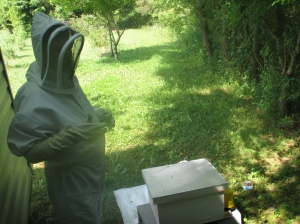We had some unusual visitors to my classroom today. We were told ahead of time they would be here and while other teachers warned their kids that they would have visitors, I didn’t much bother. No matter when I told them they would likely forget by the time of the visit, and I’m not terribly convinced they would have any idea what such a thing would even mean. In fact I wasn’t exactly sure of what the visit would look like. Except that some nicely dressed people would want to come in and observe.
To their credit, when the time came and the entourage came through the door led by our assistant principal, my kids barely took notice. They were busy and engaged with out little vocabulary exercise, looking for the words on the whiteboard or in the overlays in front of them. There was a little stutter from me but we simply forged ahead because we were honestly a bit behind with this exercised and I wanted to get through it so we could move to the next phase of the lesson. The observers found some extra chairs and pulled up a seat and must have stayed a good 20-30 minutes, which is honestly the longest I’ve ever been observed by about anyone not getting paid to spend the day with me!
When it came time to go, I waved and made eye contact with one of the fellows who waved at me with smiling eyes behind his COVID mask. I really never paid attention who was there, or what they were doing except many were taking notes, but I had this general sense that hey were pleased with what they observed. I know *I* was definitely pleased with how we were doing and I generally had fun with the lesson we were doing; enough to improvise a couple of new things with the kids which they immediately took to. I can honestly say I am enjoying this little class that I have this year, and it probably showed. Though I have no idea of how that translated into the purpose of their visit. They got a good show, for whatever it is worth. Hopefully it translates into a good evaluation!
The observers were from the United States Department of Justice, and they were there as part of a supposedly random set of observations as part of their case against the state of Georgia in the above named case. Nothing to do with election fraud or mysterious boxes of classified material here! In fact, this case has been ongoing since 2016! That’s through 3 different presidential administrations!
I have worked with the people in the Georgia Network for Educational and Therapeutic Support program (GNETS) before. In fact the post last year was largely inspired by the work I was doing with them! I also worked within that program back in the 1990’s when it was called something else. So I an intimately familiar with the work that takes place in this program and the types for students that they serve.
DoJ: We need to talk
Basically, the lawsuit comes about because the DoJ is accusing the state of Georgia of violating the civil rights of students based on their disabilities, specifically those who have severe behavior disorders. The sort of students who can do some real bodily harm to those who work with them, or to themselves. The reasoning is that such students should not be segregated, and that because they are segregated, they end up with a much poorer quality of education than their counterparts who are educated in the regular schools. Basically they are asserting that ‘separate but equal” is not equal.
There are definitely some very valid and legitimate concerns about the GNETS program and how equal it is. The fact is, is that it is treated as a bit of a pariah by the state of Georgia despite some very noble intentions. I’m actually a bit surprised that the state is bothering to go through the expense and trouble of defending it at all. I’ve dealt with GNETS across more than one county and system, and I can safely say that at no time would one consider their facilities or materials as “state of the art”. A few of you oldsters might remember the purple ditto machines used in the 1960’s and 1970’s. While working in the program, we were still using them; in 1996. In fact virtually every single thing we had in the school was a cast-off of one or two previous schools. And NONE of the buildings were ever built specifically for GNETS. We were constantly and consistently given hand-me-downs from textbooks to computers or any other technology we could scrounge up. When I think about it, it is really an embarrassment. The state’s commitment to these children is half-assed, at best.
During the past 2 years, every child in my current school could get a laptop and every classroom got a brand new stand-alone touch screen with wifi, sound system and each teacher also got 2 brand new monitors to hook up to their laptop. Prior to that, every classroom had a whiteboard projector and a state-of-the-art sound system. However, when I went to the GNETS outpost, they were housed in an old elementary school that USED to have those things but the first thing they did when GNETS moved into the facility was to remove every vestige of modern technology. Not to use in a new or different school. No, they went straight to a landfill somewhere. And I never saw any student with a laptop. I did see the walls crumbling and the sewer that backed up whenever it rained too much. But this was still nicer than where they came from; they were thrilled to be there in their ‘new’ building. And to be fair, they did have access to some things they never had before, like a gym, an outdoor play area that was enclosed and the space to install a sensory room. They had more than adequate classroom space that they never had before. But it was still kind of dilapidated with fresh paint. If GNETS didn’t exist, this building was likely destined for a wrecking ball. Which is pretty much the story behind every GNETS building I’ve ever been in. And I’ve been in a few.
There are other complaints about the lack of access to art and music programs available in other schools. From my experience and observations, these are legitimate complaints.
HOWEVER– my concern is the the DoJ might just order all of these facilities closed down altogether. And I think that might be a grave mistake.
The first thing to note is that not all GNETS programs are created equal to each other any more than any other two schools. I would pit the one in my county (despite a backed-up sewer system) against any other in the state. When done right, they can be tremendously helpful to the families that they are supporting. They can have access to a smaller environment where every single person in the building is pulling together. From the custodians to the principal, everyone is pulling together. That environment is supportive for the students and the people who work there. Yes, there is high turnover, but if it weren’t done right, it would be worse.
I’ve been to other counties where the worst case was absolutely true. The teachers didn’t care and neither did the students. In those counties, these programs were warehouses for kids no one else wanted and they simply weren’t interested in helping them get anywhere. Except maybe in prison.
But for our county specifically, I like the program and the people who work there and wish the DoJ would visit THEM to see how it is done right. Against the facilities and technology that I currently work with, it’s going to look second rate, but the treatment for those kids that are there is far from it. They are getting a therapeutic and supportive environment that enable many to return to their ‘regular’ school. The staff is fiercely dedicated to their kids, and providing for them.
My fear is that this would be broken up, so that the staff would split among the various local schools and that would increase the isolation for that staff which would translate into even more turnover. Even in a rundown building, there is a largely positive atmosphere because the staff is there to also support each other. If a kid strips, runs naked and starts flinging poop around the building, everyone knows what to do to support that student, including the custodian who is part of that specific team for these specific kids. Loosing these poor students and staff in our school of 2500 would be a nightmare for absolutely everyone. While it is still a challenge in the GNETS, they are trained and there for each other in a smaller, more supportive environment where such things aren’t getting in the way of their business. It IS their business. It’s what they do.
In the 1990’s, the state began closing down their state hospitals. Some of those hospitals I imagine were truly awful places, but I worked at one that was absolutely wonderful but it too got the axe because of a movement that basically shifted this population from residential psychiatric facilities to either the streets or to the prisons. And I fear that could be the result of this suit.
The state of Georgia definitely needs to pony up more resources toward these programs, so they can truly live up to their purpose of providing a truly therapeutic and supportive environment.










Recent Comments